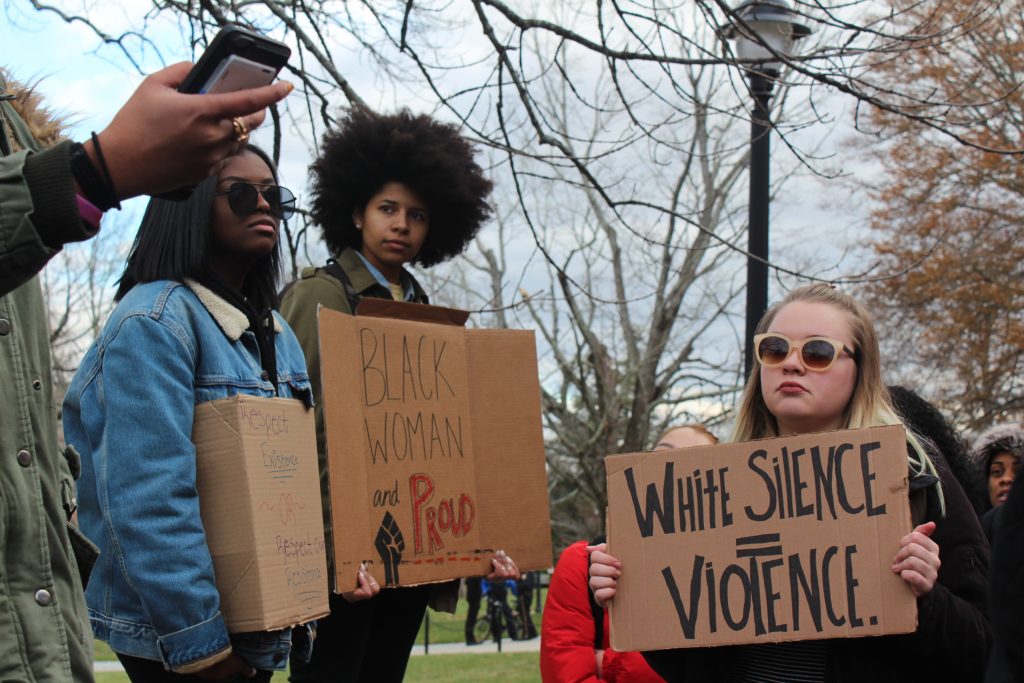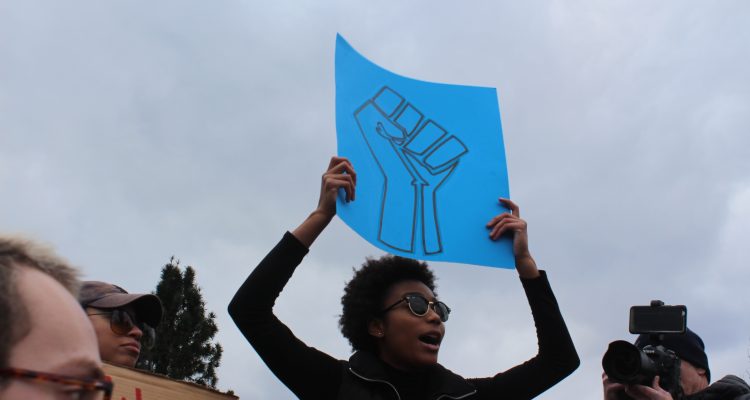By Daniela Doncel
STORRS – Over 100 University of Connecticut students and faculty marched Friday to protest the event ‘It’s Okay to Be White’ hosted by UConn’s College Republicans and to state their list of demands for the university.
With speakers of different backgrounds to share their stories and to voice their concerns, the protesters had one main message: the University should be held accountable for allowing right-wing blogger Lucian Wintrich to speak on campus.
The event ‘It’s Okay to be White’ on Tuesday, Nov. 28, made national news when Wintrich was arrested for misdemeanor breach of peace after forcefully grabbing papers from a woman who had taken them from the podium.
Omar Taweh, a UConn junior and one of the organizers of the event, says the list of demands are still a work in progress in order to make sure there is solid student feedback on the listed demands, however there are three main points on which they are focusing.
“The university actually has policies that are in place to make sure that things like this don’t happen. There’s Community Standards, there’s regulations, and there’s people that are supposed to be overseeing speakers like this before these kinds of things happen, and it wasn’t done. So, one of the demands that we have is that the university follows its own policies the way that they are spelled out in the Community Standards,” Taweh says.
“One of our demands still remains that the University in subsequent events, that they respond in adequate timely fashion,” Taweh says.
“And then a third–that’s probably the most rigid one that we would like to see happen– is an advisory committee that meets with Susan directly and it’s made up exclusively of student leaders of different organizations. We’re hoping that there will be representatives from all social justice related groups on campus and leaders in the social activist world within UConn meeting with Susan Herbst on a regular basis, weekly meeting, bi-weekly, to make sure that their voices were not going unheard,” Taweh says.

Omar Taweh delivers a speech as protestors hold up signs at the husky statue next to the Gampel Pavilion. Photo: LJ Karam
The March for Action Facebook event page said, “Time and time again, we see bias related injustices at UConn met with complacency and as a student body, we are TIRED,” along with the hashtag #ItsOkToBe.
UConn President Susan Herbst sent an announcement via email to students and faculty on Nov. 30 about the event.
Students at the March for Action were outraged at the time in which it took Herbst to respond to the incident, stating it not only took her 46 hours to respond but that she addressed the press before her own student body.
“46 Hours! They fixed the glass before they talked to us,” Lola, a speaker at the event, says.
“To make matters worse, she released a statement on Wednesday morning, which everybody thought was going to be about Tuesday night, about the General Provost, a new General Provost being named, and we were all in shock and in disbelief because how do you release an email like this the day after when everybody’s expecting you to mention this huge national news thing that was covered by BBC and Buzzfeed, whatever, and instead you mention the General Provost,” Taweh says.
In the announcement, Herbst said although many at the university found Wintrich’s comments to be loathsome and meant to provoke, he was within his First Amendment rights to speak on campus.

A student holds his fist in the air, a symbol for the movement Black Lives Matter, as he marches along with the other protestors to the Wilbur Cross building. Photo: LJ Karam
The students at the march, however, said the event made many feel unsafe and the speaker and his motivation should have been investigated before bringing him to the university.
“A simple Google search could’ve shown that Lucifer, whatever his name was, was an awful person. Let’s look at what we found when we looked at his twitter page. One, calling a man who punched a woman in the face for telling him to stop man-spreading a hero,” a speaker says.
Jane Eklund, a UConn senior studying French and English, said she was honestly upset with Herbst’s response to the event and for letting Wintrich come onto campus.
“She basically said that everyone has the freedom to speak on campus but there are rules against hate speech and it was definitely a hate speech, because he, and I quote, said ‘the country was ruled by bizarre, illegal immigrant ****** communists’ and I don’t think such slurs should be allowed in speeches in front of other students,” Eklund says.
Sarah, a sophomore and first-generation American from a Libyan family, says the university needs to hold clubs and organizations accountable for who they invite and what exactly is being said.
“Bullying and bigotry do not follow our community standards, so I don’t know why the university thinks that we should be protecting outside sources when a student who engaged in this type of activity should be receiving some kind of punishment from the university itself,” Sarah says.

Sarah speaks out to the crowd of protesting students and faculty as well as local and national media. Photo: LJ Karam
Lola, a senior and a first-generation American from a Nigerian family, says she was excited and thrilled when she was accepted to UConn until she found out she was chosen to meet a minority quota.
“I have one thing to say to Susan. Susan, my money goes to your little house, it puts gas in your car, it puts those pearls on your neck, and that smile on your face, so there should be no reason that you cannot dress me in the respect that I should deserve. You’re worried more about your image than you worried about the people who pay for you to be sitting at the seat that you’re sitting at now.”
According to Lola, Herbst and the university need to send a message that the student body matters, especially when the student body was there to help and protest the $300 million budget cut in late September.
Sneha Jayaraj, another speaker at the event, says she didn’t want to address all white people for there are “amazing allies” at the event.
“White people, it’s perfectly fine to be white, but let us be perfectly okay being ourselves too,” Jayaraj says.
Becca, a senior at UConn, says as a white woman, she wanted to speak to the white people in the crowd about whiteness, stating that white culture is not a culture but rather a tool to reinforce power.
“I am not proud to be white, because if I were to say that, I would be saying I am proud of colonization, I am proud of police brutality, I am proud of exploitation and denial, I am proud of mass incarceration, xenophobia and islamophobia. I would be saying that I am proud that 54 percent of white women voted compassion-lessly to elect #45 and I am not proud of those things,” Becca says.

Three students stand and listen to speakers while holding protest signs. Photo: LJ Karam
Becca urged white students to stand and speak up against their friends and to use their privilege to call out oppression.
“I was worried that there would be a counter protest and then the news would just divert and completely forget about the fact that there was the whole point of the march, which didn’t happen which was really really successful. We had a great great turnout. It’s really really hard to mobilize students and following Tuesday’s incident, it served as a spark for us to have this march to remind the university who they are supposed to be serving,” Taweh says.
“I do really think that this march was as successful as it possibly could have been because it generated a conversation on campus as of now that we wanted, while allowing the students that were really really passionate about Tuesday’s events to get together in solidarity with one another while discussing how we can move forward and why we should continue to move forward,” Taweh says.
According to Herbst’s announcement, she will assemble a group of UConn faculty, staff and students next week to create an effective strategy to further enhance a climate that fosters healthy debate and discussion at UConn campuses, “even if it comes at a financial cost during these difficult budget times.”
LJ Karam contributed reporting.


